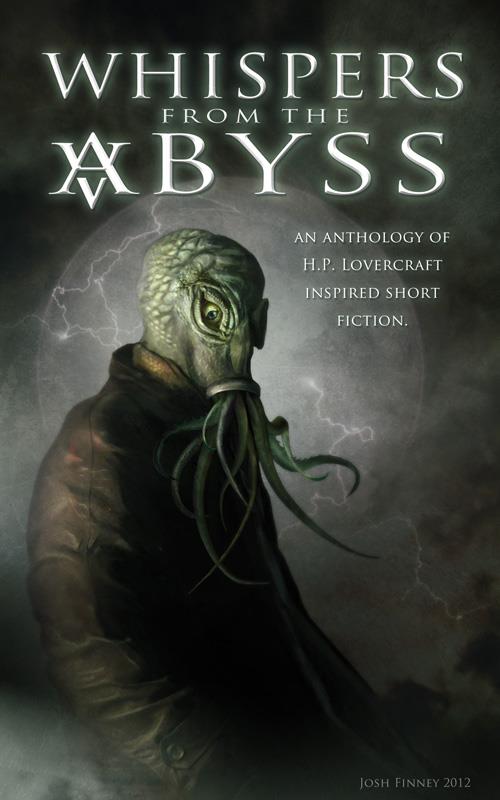 Whispers from the Abyss (01 Publishing) describes itself as “An anthology of H.P. Lovecraft inspired short fiction.” But the authors within its pages are no slavish Elvis tribute acts. Instead, they are his mutant bastard offspring, whose mission is to misbehave dreadfully and have a wonderful time doing so. These Children of the Night run amok, gleefully trashing the very idea of florid prose and pseudo-intellectual claptrap of which the Great Old One himself was sometimes guilty. Instead, they tear down the walls, splinter the timbers, rip out the wiring and delight in sending to the bottom of the ocean the HMS Lovecraft – and all who sail in her.
Whispers from the Abyss (01 Publishing) describes itself as “An anthology of H.P. Lovecraft inspired short fiction.” But the authors within its pages are no slavish Elvis tribute acts. Instead, they are his mutant bastard offspring, whose mission is to misbehave dreadfully and have a wonderful time doing so. These Children of the Night run amok, gleefully trashing the very idea of florid prose and pseudo-intellectual claptrap of which the Great Old One himself was sometimes guilty. Instead, they tear down the walls, splinter the timbers, rip out the wiring and delight in sending to the bottom of the ocean the HMS Lovecraft – and all who sail in her.
There are chunks of true brilliance within these pages. For example, one of the standout longer tales is Jason Andrew’s gonzo journalism pastiche, Fear and Loathing in Innsmouth: Richard Nixon’s Revenge. It has all the craziness and dry irony of Hunter S. Thomson himself, not to mention some great monsters and laugh-out-loud humor (“Rooster shrugged like Atlas. I wanted to punch Ayn Rand in the ovaries.”).
By way of contrast, Daisy, Age 7 by David Tallerman, chillingly shows us the experience of monsters the way only a child can express it. My reading suggests it is metaphor for the most dreadful of human acts, which made it the most powerful thing in the anthology for me.
I Do the Work of the Bone Queen by John R. Fultz is closer in spirit to Lovecraft himself, touching as it does on some real cosmic horror.
Recently, I tweeted about the hilarity of James Brogden’s The Decorative Water Feature of Nameless Dread. British to the core, it sees a man potting plants while listening to Gardeners’ Question Time on BBC Radio 4 – a sleep-inducing institution, unless you happen to be a gardener, though I have had it playing in the background from time-to-time. Discovering that one of the panellists is an expert on something called Xenolithic Topography should tell you this is no ordinary episode of the show. I read the story on a bus, and I am sure my fellow commuters thought the loudly-guffawing man with the Kindle was a bit strange. No wonder no one would sit next to me.
Too many of the stories were, I felt, rather slight. Flash fiction is fine in small doses, but reading so many that took between one and seven minutes to read could get a little tiresome now and then. Which is not to say they were bad; indeed each and every one was well crafted, some with a real punch to them, though others were little more than bijou that scratched the surface of what could have been longer works. In a way, they are antithesis of Lovecraft, with his slow buildup, creeping dread leading up to the dénouement. Instead, we get a large number that are more “wham, bam, thank you, ma’am” and less satisfying as a result.
Though Waiting by Dennis Detwiller, one of the short works I mentioned earlier, is one of the best in the collection. With its World War II period setting, and a scary encounter in a New Mexico bus station, it manages in a short span to put a clammy hand on the reader and infuse them with the very creeping dread that Lovecraft was so good at.
I have highlighted only a few of the many hugely enjoyable stories within these pages (carping about the brevity of some aside, there is much here to love, and many of the 33 stories within are worth the price of admission alone – besides, your bus commute may be short enough for the flash fictions to be the perfect boredom antidote).
Finally, as with the best of anthologies, it’s best to finish with a killer punch. And editor Kat Rocha has certainly done that by selecting for the finale Death Wore Greaspaint by Josh Finney (who also did the spectacular cover art – Josh, I hate you for being so talented!). The tale of a long-suffering TV studio manager who learns that that his psychotic clown brother is going postal on a children’s programme, is a pure delight from beginning to end. Weird, funny, perfectly written, this is one that will stay with me long after I’ve put the book down.
Incidentally, if you’re not into e-books, the print version came out on 4 November 2014.

















Speak Your Mind